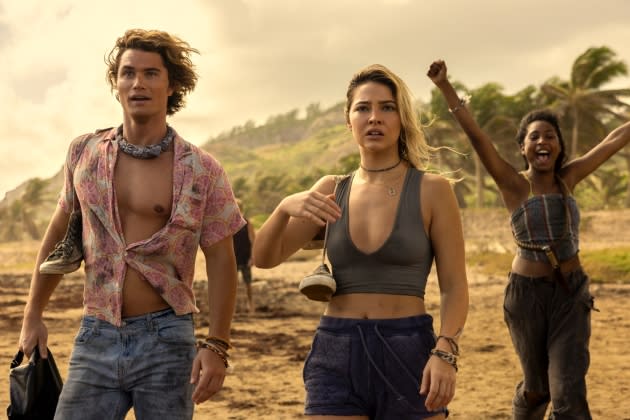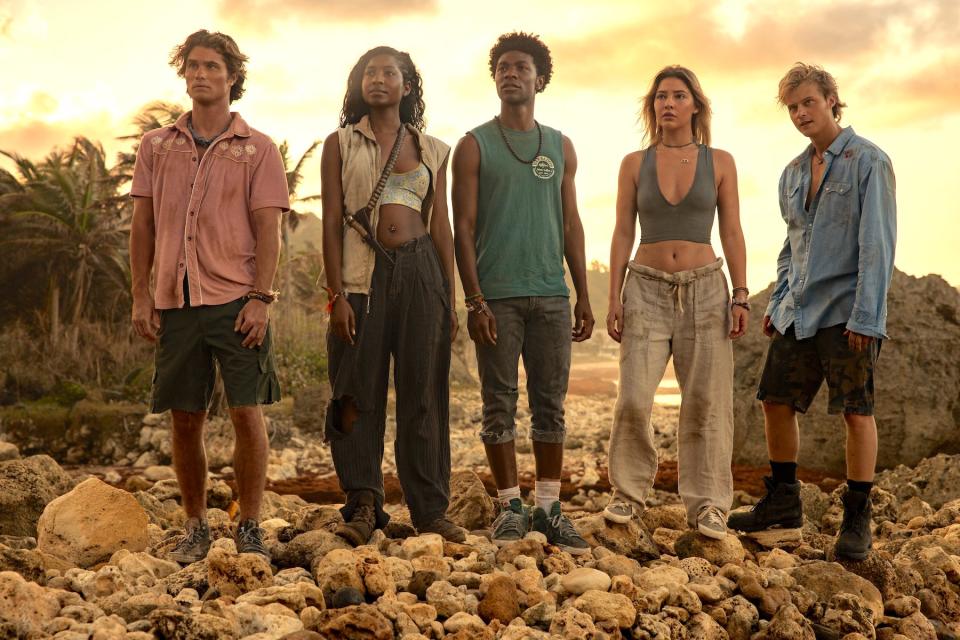Netflix’s ‘Outer Banks’ Buries Itself in Ridiculous Season 3

At this point, it’s a rite of passage for each generation to have their own show full of sexy teens running on a beach. Everyone knows Outer Banks is no different — everyone, that is, except the show itself.
One of Netflix’s most successful young adult series, Outer Banks premiered in April 2020 to high ratings — an escape from the content wastelands that had less to do with the show’s quality and more to do with the sheer amount of streaming time the early days of the COVID-19 pandemic gave people. Set in North Carolina’s Outer Banks, the series follows Kildare Island resident John B. Rutledge (Chase Stokes) and his friends Kiara (Madison Bailey), Pope (Jonathan Daviss), and JJ (Rudy Pankow), known as the Pogues (a play on “pogies,” a type of small fish). After a chance discovery of a sunken ship, the four embark on a hunt for long-lost treasure and John B’s missing father.
More from Rolling Stone
Netflix Probes Alex Murdaugh's Trail of Dead Bodies and Missing Millions
Netflix's 'Waco: American Apocalypse' Trailer Captures Fallout of David Koresh Cult Takedown
The Pogues, poor kids from the island, are at constant odds with the Kooks, the rich poseurs. It’s unserious class warfare fought over beach bonfires and country club events (that the Pogues work, of course) that quickly devolves into car chases, grave-digging, escapes to the Caribbean, and so many shootouts. Plus, you can’t spell Netflix teen original without gratuitous love triangles, which is where John B’s star-crossed love affair with Kook princess Sarah Cameron (Madelyn Cline) comes in.
At the end of Season Two, an attempt to secure the priceless Cross of Santo Domingo left the Pogues and Sarah empty-handed and bruised. By sheer luck, and the intervention of Jamaican newcomer Cleo (Carlacia Grant), the friends got out of enemy hands and became stranded on a desert island nicknamed Poguelandia. While Season Three — premiering Feb. 23 — opens with the Pogues cheerfully enjoying their tropical paradise, it quickly leaves the island behind, sending the intrepid teens on the run (once again) in a last-ditch attempt to find their fortune and maybe stay alive in the process.
Beyond its fortuitous debut date, Outer Banks was buoyed by the undeniable charm its attractive acting newcomers gave the sepia-toned paradise romp. And even the mediocre writing was kept afloat by the chemistry Stokes, Bailey, Daviss and Pankow brought to the Pogues, making poor parental supervision and seemingly unlimited access to Urban Outfitters booty shorts somehow seem gripping. Though the show kept throwing up artificial roadblocks to keep its sparse plot chugging along, the expansion of Kiara’s role in Season Two, and the Pope family’s ties to the treasure, kept Outer Banks from fully relegating its characters of color to the sidelines. It’s a pity, then, that Season Three sacrifices nearly all of the show’s original charm to keep its already-unbelievable treasure hunt theme going just a little while longer.

Season Three of Outer Banks relies heavily on narration and flashbacks to keep its momentum going, a party trick that does little to hide its thin plot. And even when cast members like Pankow sell their limited material, any emotional stakes are immediately overwhelmed by another confrontation at gunpoint. Somehow, the presence of a thousand hands for hire, constant street chases and shootouts aren’t enough to make the hour-long episodes go faster. And if Avatar: The Way of the Water proved anything, it’s that people get tired when all your characters do is get shot at, taken captive, freed, and then taken captive again. If I’m not gonna take that shit from award-winning director James Cameron, I sure as hell won’t let it slide from a Netflix Original about a group of kids that always make the dumbest choices possible.
People were never watching Outer Banks for the story. They came for an island-y respite from the early months of the pandemic and found intriguing scenes of intrepid teenage kids squaring off against a coterie of wealthy, extraordinarily entitled white assholes. And they stayed for shots of hot teens glistening in the North Carolina sun. By continually leaving the Outer Banks behind for ever-bigger treasure hunts, however, the series’ sense of scale snapped viewers’ already-suspended disbelief, sending the whole thing crashing down on top of itself. Season Three fails to find a compelling reason for Outer Banks’ story to continue, and leaves little doubt that sustaining a fourth season may be an impossible mission for the Pogues.
Best of Rolling Stone
